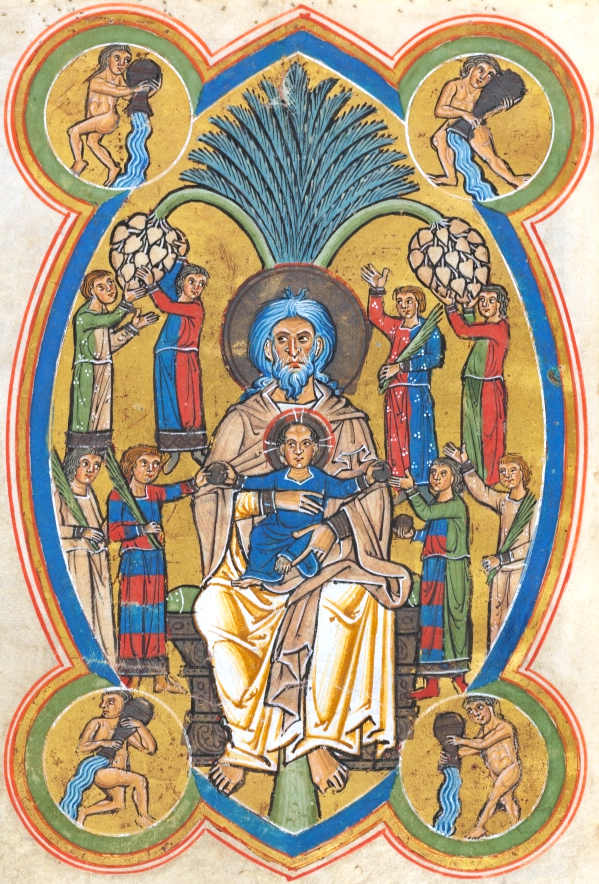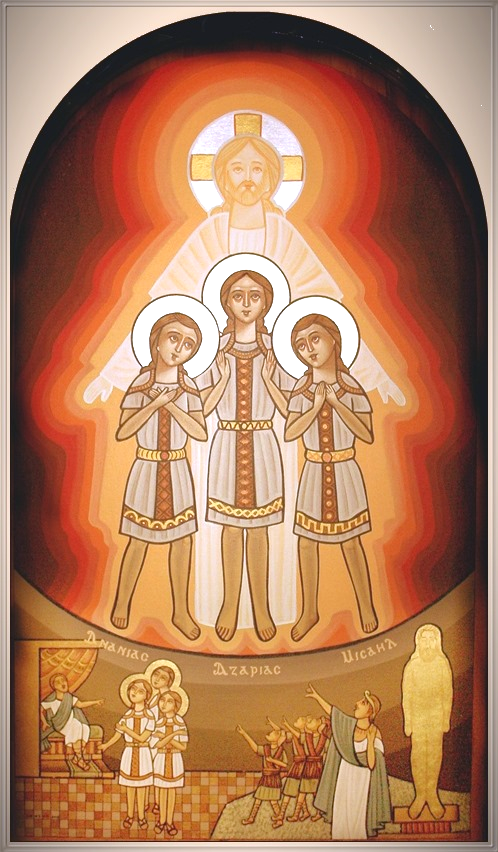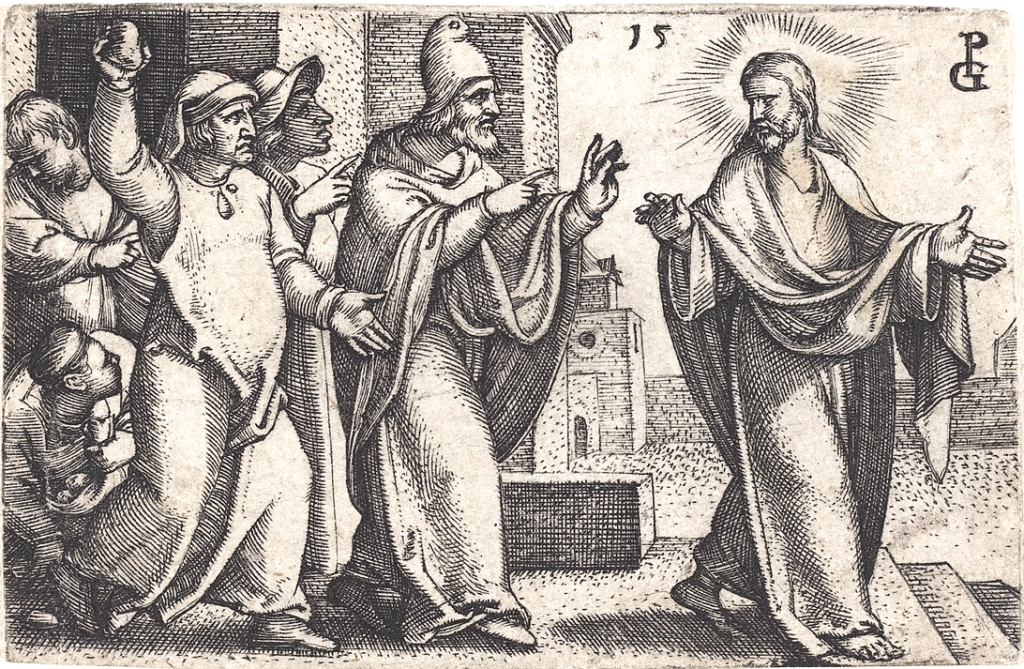Translation of the Holy Gospel According to John
At that time, Jesus said to the multitudes of the Jews: Which of you shall convince Me of sin? If I say the truth to you, why do you not believe Me? He that is of God, heareth the words of God. Therefore you hear them not, because you are not of God. The Jews therefore answered, and said to Him: Do not we say well, that Thou art a Samaritan, and hast a devil? Jesus answered: I have not a devil, but I honor My Father, and you have dishonored Me. But I seek not My own glory; there is One that seeketh and judgeth. Amen, amen, I say to you, If any man keep My word, he shall not see death for ever. The Jews therefore said: Now we know that Thou hast a devil. Abraham is dead, and the prophets; and Thou sayest: If any man keep My word, he shall not taste death for ever. Art Thou greater than our father Abraham, who is dead? and the prophets are dead. Whom dost Thou make Thyself? Jesus answered: If I glorify Myself, My glory is nothing. It is My Father that glorifieth Me, of Whom you say that He is your God. And you have not known Him; but I know Him. And if I shall say that I know Him not, I shall be like to you, a liar. But I do know Him, and do keep his word. Abraham your father rejoiced that he might see My day: he saw it, and was glad. The Jews therefore said to Him: Thou art not yet fifty years old, and hast Thou seen Abraham? Jesus said to them: Amen, amen, I say to you, before Abraham was made, I AM. They took up stones therefore to cast at Him; but Jesus hid Himself, and went out of the temple.
From St. Augustine’s Homilies on John: XLIII
But what sayest Thou, O Lord, of Thyself? Verily, verily, I say unto you, If a man keep my saying, he shall never see death. Ye say, Thou hast a devil. I call you to life: keep my word and ye shall not die. They heard, He shall never see death who keepeth my word, and were angry, because [they were] already dead in that death from which they might have escaped…
Thus spake the Lord (it is scarcely sufficient to say), as one dying to dying men; for to the Lord also belong the issues from death, as saith the Psalm. Seeing, then, He was both speaking to those destined to die, and speaking as one appointed to death Himself, what mean His words, He who keepeth my saying shall never see death; save that the Lord saw another death, from which He was come to deliver us-the second death, death eternal, the death of hell, the death of damnation with the devil and his angels? This is real death; for that other is only a removal. What is that other death? The leaving of the body-the laying down of a heavy burden; provided another burden be not carried away, to drag the man headlong to hell. Of that real death then did the Lord say, He who keepeth my saying shall never see death.
Let us not be frightened at that other death, but let us fear this one. But, what is very grievous, many, through a perverse fear of that other, have fallen into this. It has been said to some, Adore idols; for if you do it not, you shall be put to death: or, as Nebuchadnezzar said, If you do not, you shall be thrown into the furnace of flaming fire. Many feared and adored. Shrinking from death, they died. Through fear of the death which cannot be escaped, they fell into that which they might happily have escaped, had they not, unhappily, been afraid of that which is inevitable. As a man, thou art born-art destined to die. Whither wilt thou go to escape death? What wilt thou do to escape it? That thy Lord might comfort thee in thy necessary subjection to death, of His own good pleasure He condescended to die. When thou seest the Christ lying dead, art thou reluctant to die? Die then thou must; thou hast no means of escape. Be it today, be it tomorrow; it is to be-the debt must be paid. What, then, does a man gain by fearing, fleeing, hiding himself from discovery by his enemy? Does he get exemption from death? No…
But those men, indignant, yet dead, and predestinated to death eternal, answered with insults, and said, Now we know that thou hast a devil. Abraham is dead, and the prophets. But not in that death which the Lord meant to be understood was either Abraham dead or the prophets. For these were dead, and yet they live: those others were alive, and yet they had died…
Your father Abraham rejoiced to see my day; and he saw, and was glad. Abraham’s seed, Abraham’s Creator, bears a great testimony to Abraham. Abraham rejoiced, He says, to see my day. He did not fear, but rejoiced to see it. For in him there was the love that casteth out fear. He says not, rejoiced because he saw; but rejoiced that he might see. Believing, at all events, he rejoiced in hope to see with the understanding. And he saw. And what more could the Lord Jesus Christ say, or what more ought He to have said? “And he saw, He says, and was glad…
The angry Jews replied, Thou art not yet fifty years old, and hast thou seen Abraham? And the Lord: Verily, verily, I say unto you, Before Abraham was made, I am. Weigh the words, and get a knowledge of the mystery. Before Abraham was made. Understand, that was made refers to human formation; but am to the Divine essence. He was made, because Abraham was a creature. He did not say, Before Abraham was, I was; but, Before Abraham was made, who was not made save by me, I am. Nor did He say this, Before Abraham was made I was made; for In the beginning God created the heaven and the earth; and in the beginning was the Word. Before Abraham was made, I am. Recognize the Creator – distinguish the creature. He who spake was made the seed of Abraham; and that Abraham might be made, He Himself was before Abraham.
Hence, as if by the most open of all insults thrown at Abraham, they were now excited to greater bitterness. Of a certainty it seemed to them that Christ the Lord had uttered blasphemy in saying, Before Abraham was made, I am. Therefore took they up stones to cast at Him. To what could so great hardness have recourse, save to its like? But Jesus [acts] as man, as one in the form of a servant, as lowly, as about to suffer, about to die, about to redeem us with His blood; not as He who is-not as the Word in the beginning, and the Word with God. For when they took up stones to cast at Him, what great thing were it had they been instantly swallowed up in the gaping earth, and found the inhabitants of hell in place of stones? It were not a great thing to God; but better was it that patience should be commended than power exerted. Therefore He hid Himself from them, that He might not be stoned. As man, He fled from the stones; but woe to those from whose stony hearts God has fled?



